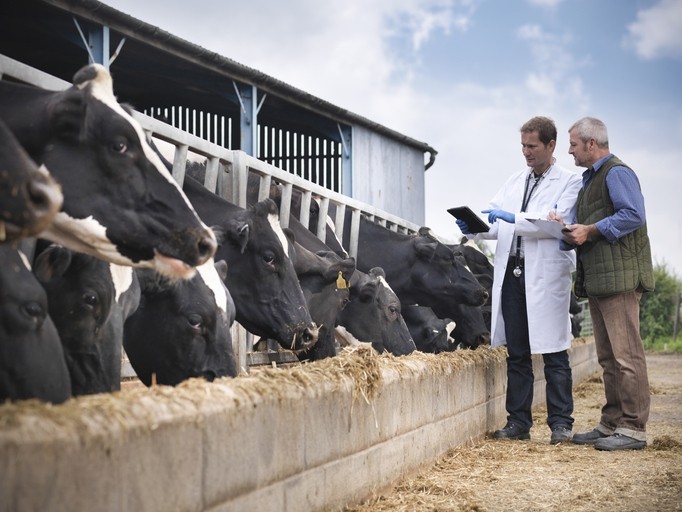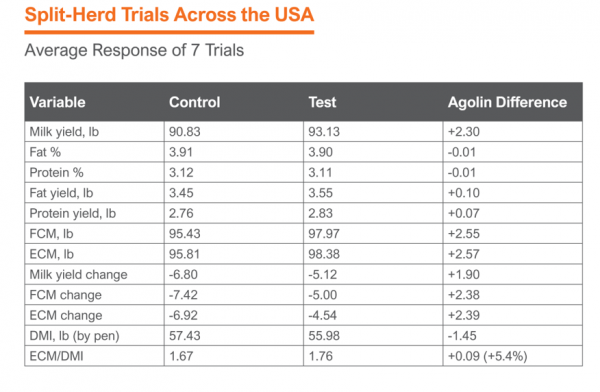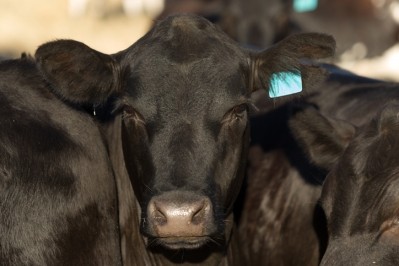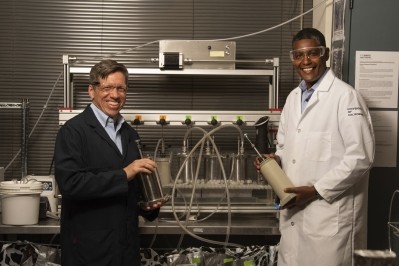Feedworks USA: Split-herd research confirms plant extract product improves milk production and feed efficiency

The trials measured milk performance by cow and feed efficiency by pen over three- to four-month periods, said the distributor. There were more than 6,000 cows included in the studies with half receiving a diet containing Agolin Ruminant and half a control diet. Only data collected from cows that remained in the test pens for the duration of the trial were used in the analyses.
The company said the findings indicate an average 2.57-pound (1.17kg) improvement in energy corrected milk (ECM) with a 1.45-pound decrease in dry matter intake (DMI) for the Agolin-fed cows.
“These trials demonstrate an average 12:1 benefit-to-cost ratio or a profit of $0.60 per cow per day,” said Peter Williams, Agolin Ruminant manager. “The potential gains of more milk and less feed dwarf the approximate $0.05 cost per cow per day.”
Feedworks USA said independent consulting nutritionist, Dr Essi Evans, assisted it with trial design and data analysis, to help ensure accurate data.
“These results were determined on working farms that deal with the many typical daily events that impact milk production. The treated cows and the control cows were all exposed to the same conditions, the same environmental factors, and the same feed ingredient changes for the exact same period,” he explained.
Methane emissions
Agolin Ruminant was originally introduced in 2007 as a product to improve milk production and feed efficiency, however researchers were also able to demonstrate that it lowered enteric methane, diverting the saved energy into milk production.
The Carbon Trust confirmed that the plant-based feed additive can reduce methane emissions in dairy cows, beef cattle and sheep. The opinion was reached following an appraisal of academic references, published scientific journals and field reports.
The product is developed and manufactured in Switzerland by Agolin SA. Feedworks is the product representative in the US. The main active compounds within the supplement are food grade and chemically defined plant extracts including coriander (Coriandrum sativum) seed oil (up to 10%), eugenol (up to 7%), geranyl acetate (up to 7%) and geraniol (up to 6%) along with some preservatives such as fumaric acid.
Agolin Ruminant is suitable for use in all types of dairy cow farming, said Williams. There is also an organic version of the product.
The plant extract product is typically applied through a mineral mix or feed added to the TMR, he told us previously. “Larger dairies buying a separate mineral mix would have it included in that mix.”
Earlier research
A meta-analysis combining 23 studies across 10 different countries, published in 2020, showed that Agolin supplementation increased milk yield by 3.6%, fat and protein corrected milk by 4.1% and feed efficiency by 4.4%, plus methane emissions were estimated to be lowered by about 10%, said Feedworks USA.
A University of California-Davis study evaluated 20 mid-lactation Holsteins, grouped by parity and days in milk and randomly assigned to a top-dressed treatment with Agolin or an un-supplemented control. During the 56-day trial, a research team led by Frank Mitloehner, professor of animal science at UC-Davis, used head chambers to sample enteric gas emissions, including methane, carbon dioxide, ammonia, and nitrous oxide. “Results showed that enteric methane was reduced by 11.2% per unit of milk in the Agolin-supplemented cows, and enteric ammonia was 18% lower. Dry matter intake was similar between both groups.”
Meanwhile, a field trial at Spruce Haven Dairy, Union Springs, New York, indicated a $0.72 gain per cow per day for the cost of about $0.05 per day, said the company.
The study included four pens of around 150 multiparous, mid-lactation cows per pen, with cows averaging more than 110 pounds of milk per day. All cows received a common TMR ad libitum, with Agolin administered to two pens via a concentrated farm pack to provide one gram per cow per day.
Milk yield did not change with the inclusion of Agolin, but fat and protein percentages were elevated. There was a significant improvement in fat yield per cow per day, resulting in a tendency for fat corrected milk and energy corrected milk to be greater for the Agolin-fed group, reported Feedworks USA.
















